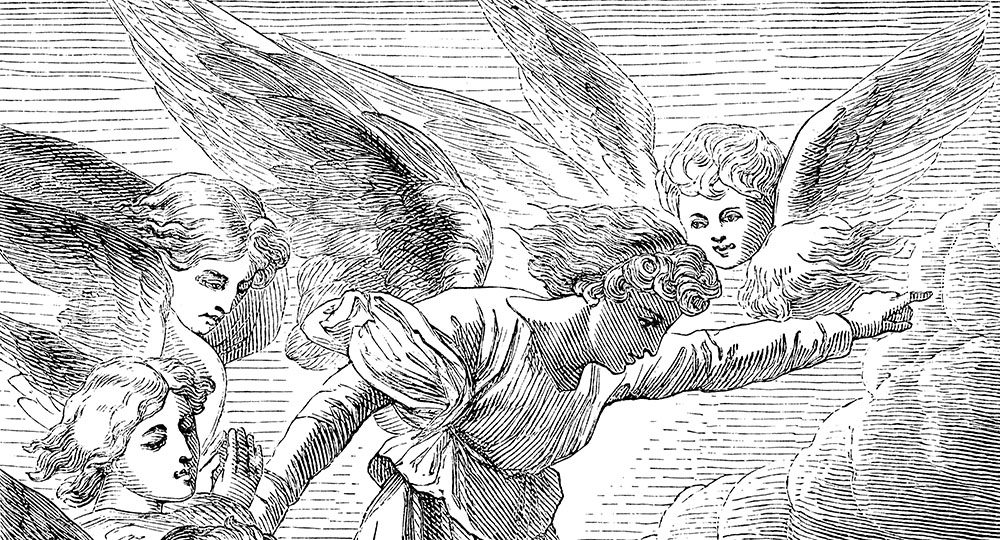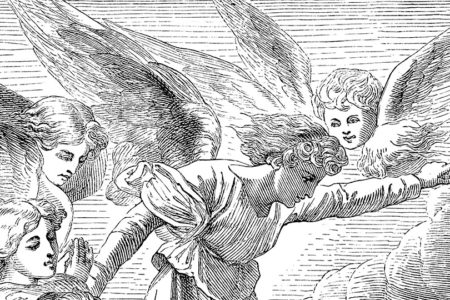Jesus Is Better Than the Angels
Introduction
When writing to his Jewish readers of the apostolic age, the author of the Epistle to the Hebrews wanted to demonstrate the superiority of the divine revelation that gave birth to Christianity over the divine revelation upon which Judaism was based. In order to accomplish that goal, the writer argued that the new, Christian revelation was superior to and had superseded the old revelation of Judaism because God delivered that new revelation through a superior person, Jesus Christ.
The heart of the divine revelation upon which Judaism was based was the law. The Jews had boasted that the law had been given by God to Moses through angels (cf. Acts 7:53; Gal 3:19; Heb. 2:2). The fact that the law had been delivered through angels prompted the Jews to conclude that the law portion of their Judaic revelation would never be superseded by anything better.
In order to shatter that conclusion, the writer of Hebrews presented three lines of proof? That Jesus Christ is superior to angels.
Proof From The Old Testament Scriptures
Being made so much better than the angels, as he hath by inheritance obtained a more excellent name than they. For unto which of the angels said he at any time, Thou art my Son, this day have I begotten thee? And again, I will be to him a Father, and he shall be to me a Son? And again, when he bringeth in the first-begotten into the world, he saith, And let all the angels of God worship him. And of the angels he saith, Who maketh his angels spirits, and his ministers a flame of fire. But unto the Son he saith, Thy throne, O God, is forever and ever; a scepter of righteousness is the scepter of thy kingdom. Thou hast loved righteousness, and hated iniquity; therefore, God, even thy God, hath anointed thee with the oil of gladness above thy fellows. And, Thou, Lord, in the beginning hast laid the foundation of the earth; and the heavens are the works of thine hands. They shall perish, but thou remainest; and they all shall become old as doth a garment, And as a vesture shalt thou fold them up, and they shall be changed; but thou art the same, and thy years shall not fail. But to which of the angels said he at any time, Sit on my right hand, until I make thine enemies thy footstool? Are they not all ministering spirits, sent forth to minister for them who shall be heirs of salvation? (Heb. 1:4–14).
In Hebrews 1:4–14, the writer used the Old Testament Scriptures—the written revelation upon which Judaism was based—to prove his point. He argued that in several ways the Old Testament indicated that Jesus Christ is superior to angels.
First (1:4–5a), although angels collectively are called “the sons of God” (Job 1:6; 38:7), God never called an individual angel “my son.” By way of contrast, in Psalm 2:7 God called Jesus Christ “my Son.” Thus, the Old Testament indicated that Jesus Christ had a more excellent name than angels.
Second (Heb. 1:5b), on the basis of 2 Samuel 7:14, which says, “I will be his father, and he shall be my son,” the writer of Hebrews concluded that the Old Testament thereby indicated that Jesus Christ has a unique relationship to God that the angels do not have. Nowhere did the Old Testament state or imply that the angels ever enjoyed the kind of Father Son relationship with God that Jesus Christ does.
Third (Heb. 1:6), in Psalm 97:7 God commanded all the angels to worship Jesus Christ. Since the Scriptures forbid angels to be worshiped and teach that only deity is to be worshiped (Col. 1:18; Rev. 22:8–9), the fact that God commanded all the angels to worship Jesus Christ indicates that He is deity and, therefore, is far superior to the angels.
Fourth (Heb. 1:7–9), Psalm 104:4 indicates that God created the angels to have changeable ministries (like the sudden shifting of the wind or the flickering of a flame). In contrast, according to Psalm 45:6–7, God has appointed Jesus Christ to have a permanent divine rule. It should be noted that God the Father ascribed absolute deity to Jesus Christ twice in that Old Testament passage. Two times the Father called the Son “God.”
Fifth (Heb. 1:10–12), according to the writer of Hebrews, Psalm 102:25–27 indicates that Jesus Christ, not the angels, is the eternal creator of the universe. In line with this, the Apostle Paul taught that Christ’s creation of the universe included His creation of the angels (Col. 1:16). Thus, as the eternal creator who brought the angels into existence, Jesus Christ is superior to them. Surely the creator is far superior to His creatures.
Sixth (Heb. 1:13–14), after Jesus Christ died for the sins of mankind, rose from the dead, and ascended to heaven, God exalted Him by having Him sit at His right hand (cp. Heb. 1:3; Acts 2:32–36). Psalm 110:1 foretold this exaltation. In contrast to the exalted Jesus Christ, angels are servants to those humans who will inherit salvation.
Thus, in at least six ways, the Old Testament, which contained the divine revelation upon which Judaism was based, indicated that Jesus Christ is superior to the angels.
Proof From Jesus Christ’s Sovereign Position
Therefore, we ought to give the more earnest heed to the things which we have heard, lest at any time we should let them slip. For if the word spoken by angels was steadfast, and every transgression and disobedience received a just recompense of reward, How shall we escape, if we neglect so great salvation, which at the first began to be spoken by the Lord, and was confirmed unto us by them that heard him, God also bearing them witness, both with signs and wonders, and with diverse miracles and gifts of the Holy Spirit, according to his own will? For unto the angels hath he not put in subjection the world to come, of which we speak. But one in a certain place testified, saying, What is man, that thou art mindful of him? Or the son of man, that thou visitest him? Thou madest him a little lower than the angels; thou crownedst him with glory and honor, and didst set him over the works of thy hands; Thou hast put all things in subjection under his feet. For in that he put all in subjection under him, he left nothing that is not put under him. But now we see not yet all things put under him. But we see Jesus, who was made a little lower than the angels for the suffering of death, crowned with glory and honor, that he, by the grace of God, should taste death for every man (Heb. 2:1–9).
The author of Hebrews temporarily interrupted his argument by inserting a parenthetical warning to his Jewish readers against drifting away from the new body of revelation that came through Jesus Christ and gave birth to Christianity (2:1–4). If his readers drifted away from the new revelation without fully accepting and practicing it, they would expose themselves to severe judgment. In Old Testament times, those who drifted away from the old Judaic revelation that had been delivered through angels received severe judgment. In light of that, how much greater would be the judgment of those who would drift away from the superior revelation that had come through Jesus Christ, especially if they were to drift away after witnessing the supernatural ways in which God authenticated that new revelation through the miraculous works and spiritual gifts of the apostolic proclaimers of that revelation?
After this warning, the author continued his argument with his second line of proof that Jesus Christ is superior to angels (2:5–9). The writer indicated that God has given to Jesus Christ the position of sovereign ruler over the earth during the coming millennial age. God did not give that position to angels (2:5).
After God created the earth, He appointed mankind to have dominion over all things on this planet (2:6–8b; cp. Gen. 1:26). The entrance of sin through the fall of the human race (Gen. 3) prevented mankind from exercising their dominion to the fullest intended extent (2:8c). Through Christ’s incarnation in human flesh (Jn. 1:14), He was made a little lower than the angels (in the realm of His humanity) for a brief period of time so that Christ could die as mankind’s substitute, thus regaining for mankind full dominion over the earth. He will exercise that full dominion for mankind when, as the last Adam, He rules the earth in the future Millennium. The fact that Jesus Christ was crowned with glory and honor by God when He ascended to heaven after His death and resurrection guarantees His future rule over God’s earthly creation (2:9).
Thus, God has given Jesus Christ a superior position that none of the angels will ever hold.
Proof From Salvation
For it became him, for whom are all things, and by whom are all things, in bringing many sons unto glory, to make the captain of their salvation perfect through sufferings. For both he that sanctifieth and they who are sanctified are all of one, for which cause he is not ashamed to call them brethren, Saying, I will declare thy name unto my brethren, in the midst of the church will I sing praise unto thee. And again, I will put my trust in him. And again, Behold I and the children whom God hath given me. Forasmuch, then, as the children are partakers of flesh and blood, he also himself likewise took part of the same, that through death he might destroy him that had the power of death, that is, the devil, And deliver them who, through fear of death, were all their lifetime subject to bondage. For verily he took not on him the nature of angels, but he took on him the seed of Abraham. Wherefore, in all things it behooved him to be made like his brethren, that he might be a merciful and faithful high priest in things pertaining to God, to make reconciliation for the sins of the people. For in that he himself hath suffered being tempted, he is able to help them that are tempted (Heb. 2:10–18).
In his third line of proof that Jesus Christ is superior to the angels, the writer of Hebrews asserted that Christ did something that angels could not do. He obtained salvation for mankind from Satan, death, and sin.
Having just introduced the fact that Christ became incarnate in human flesh and suffered death, the author told why He did so—in order to be perfected as the captain or author of mankind’s salvation (2:10).
The word translated “perfect” has two possible meanings. First, it may mean to bring to an ethical or moral perfection. This meaning implies passage from a state of ethical or moral imperfection to a state of ethical or moral perfection. Second, it may mean to bring to a desired end, to complete.
Because Christ, as deity, was already ethically and morally perfect by nature from eternity past, there was no way that He could become ethically or morally perfect through incarnation and death; therefore, the first meaning of “perfect” cannot be the one the author had in mind. He must have been referring to the second meaning.
The author was teaching that through His incarnation and sufferings, Christ completed or brought to the desired end the divine goal that had been determined for Him in eternity past—the goal of becoming the author of mankind’s salvation.
In order to be the author of mankind’s salvation, Christ Himself had to be a kinsman of mankind. For that reason, He became human through incarnation (2:11–13; cp. Jn. 1:14). Having become human, He suffered death in order to render Satan inoperative in his power (2:14), to free mankind from death and the fear of death (2:15–16), to make satisfaction for the sins of mankind (2:17), and to help those who are tempted (2:18).
Thus, Jesus Christ did something that the angels could not do. He obtained salvation for mankind from Satan, death, and sin.
Conclusion
The Book of Hebrews presents three lines of proof that Jesus Christ is superior to angels: proof from the Old Testament Scriptures, proof from Jesus Christ’s sovereign position, and proof from salvation.
According to the writer of Hebrews, the fact that Jesus Christ is superior to angels should have great significance to Jewish people. Because Jesus Christ is superior to angels, the divine revelation that came through Him and gave birth to Christianity is superior to the earlier revelation that came through angels and upon which Judaism was based.
In addition, the fact that Jesus Christ is superior to angels should have great significance for those groups that teach that Jesus Christ is a created angel of God. The arguments for Christ’s superiority over angels presented by the author of Hebrews, particularly those that demonstrated His absolute deity, are devastating to that erroneous view.








